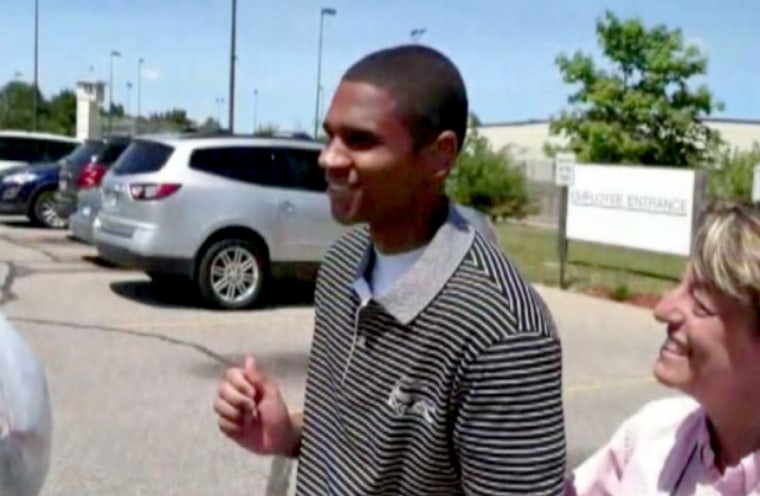The top prosecutor in Wayne County, Michigan, on Thursday defended her office’s actions in a wrongful conviction that kept a man in jail for nearly nine years, even as the freed man said he had no interest in playing "the blame game."
"It's over. I'm out. That's all I really wanted was my freedom," Davontae Sanford, 23, said at a Thursday afternoon news conference surrounded by family and friends.
"I'd like to take this time to re-unite with my family and try to get my life back on track. I'm not about to play the blame game with nobody."
Sanford was just 14 in September 2007 when police found him in his pajamas near a crime scene outside a drug house in Detroit. Four people inside had been gunned down. After two days of interrogations, police announced that he had confessed.
Prosecutors now acknowledge the truth Sanford knew all along: He didn't do it. The case against him unraveled after a professional hit man confessed — for the second time — in an affidavit that he was responsible for the slayings, not Sanford.
Prosecutor Kym Worthy's office has come under criticism for why Sanford was locked up for so many years.
Related: Davontae Sanford, Wrongly Convicted of 4 Murders at Age 14, to Be Freed
"This was not a case where allegations were made and not followed up," Worthy said at a news conference just hours before Sanford spoke to reporters. "We did everything we could do to follow up."
Worthy, however, said the confessions by Vincent Smothers — who is currently in prison for eight other murders — weren't the reason why the case against Sanford was dropped.
In laying out the prosecution's timeline of events, Worthy said, the driving force came once they learned that a former Detroit police officer's latest statement to Michigan State Police appeared to contradict his earlier sworn testimony.
Former Deputy Chief James Tolbert testified that Sanford drew the crime scene of the home for him on a blank piece of paper during his investigation, and the picture included the locations where the bodies were found. But in more recent comments to a state investigator, Tolbert said that he drew the crime scene — and Sanford only drew the bodies.
Related: Dateline Digital Series: Conviction
Worthy said the new statement "undermines" his testimony and "calls into question the building blocks in our case."
Sanford lived near the scene of the killings in Detroit's northeast side, and was standing outside in his pajamas when police were looking for witnesses. They took him in, and believed he had key information.
But his defenders noted that Sanford, who is developmentally impaired and blind in one eye, was known for telling elaborate tales.
Police said he told them he used a mini-14 rifle in the shooting — even though no shell casings from the scene matched that type of gun and a murder weapon was never found.
Related: Man Convicted of Brooklyn Murder Exonerated After 52 Years
But there was gunshot residue on Sanford’s clothes, which was used as evidence to corroborate his confession. In addition, police used a tracking dog that led them to Sanford's home. The sole adult to survive the shooting also told police that he heard the teen's voice inside the home.
Finally, Worthy said, Sanford pleaded guilty on the second day of his trial in 2008 instead of having his defense team challenge the second-degree murder charges.
She acknowledged that there are cases in which people who are innocent end up pleading guilty as part of a deal.
"I don’t have no other choice but to make something of myself."
But Sanford, she added, had every opportunity to speak with his lawyers and his family, and he was examined by a licensed medical professional who determined he was competent to stand trial.
Sanford was sentenced by a judge at a bench trial to 37 to 90 years in prison — and would have been age 53 at his earliest possible release date.
Sanford's public defender at the time, Robert Slameka, has since been criticized for providing shoddy legal representation, never challenging Sanford's initial confession in court. Slameka's law license is currently under suspension, and he had been admonished dozens of times for misconduct, according to reports.
Worthy, however, questioned why the defense never had Smothers testify officially when he had the chance during the appeals process.
"It’s not hard for me to understand that mistakes are made," Worthy told reporters, adding that she didn't know how she would have prosecuted the case differently.
"We had a good reason to charge" at the time, she said.
Sanford said he enjoyed his first meal outside of prison of Chinese food. He hopes to attend college and share his experience with at-risk youth and juveniles in the justice system.
"I just want to try to move forward and put all this behind me," he said. "Go from there and live life. Do some things I've never been able to do before, like, learn how to drive, get my driver's license, things like that."
He then leaned over and whispered in his mother's ear and told her not to cry.

